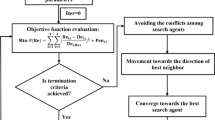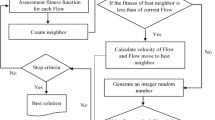Abstract
Reservoirs’ optimal operation is a critical issue in the management of surface water resources. In the present study, after combining the whale optimization algorithm (WOA) with genetic algorithm (GA), which is called hybrid whale-genetic algorithm (HWGA), the precision and convergence rate of HWGA is evaluated in the optimal operation of continuous-time four-reservoir benchmark system (FRBS) and ten-reservoir benchmark system (TRBS). This combination benefits from the GA high precision and the WOA high convergence rate. The precision and convergence rate of HWGA, GA, and WOA are compared to the absolute optimum solution, obtained using Lingo software. Results indicated that the absolute optimal solution was 308.292 in the FRBS and 1194.441 in the TRBS. The best optimal solutions using the HWGA, GA and WOA were 96.08%, 95.76%, and 85.19% of the absolute optimal in the FRBS, respectively, and 97.24%, 89.54%, and 84.42% of the absolute optimal in the TRBS, respectively. So, the precision of HWGA, GA and WOA ranked first to third, respectively. Also, the variation coefficient of HWGA solutions (0.006 in the FRBS and 0.011 in the TRBS) had the lowest value in both benchmark systems. The variation coefficients of GA and WOA solutions were 1.24 and 3.57 times the variation coefficient of HWGA in the FRBS, respectively, and 1.55 and 5.32 times the variation coefficient of HWGA in the TRBS, respectively. Therefore, it could be concluded that in the current study the HWGA solutions variation range was narrower than other algorithms’ solutions. According to four criteria of the objective function average, standard deviation, number of population, and maximum number of iterations, the performance of the algorithms in the present study is compared to the performance of some algorithms in other literatures using Technique for Order of Preference by Similarity to Ideal Solution (TOPSIS). The results of TOPSIS indicated that HWGA ranked first and WOA ranked last in both benchmark systems.






Similar content being viewed by others
References
Ahmadianfar I, Adib A, Salarijazi M (2015) Optimizing multireservoir operation: hybrid of bat algorithm and differential evolution. J Water Resour Plan Manag 142(2):05015010
Bozorg-Haddad O, Moravej M, Loáiciga HA (2014) Application of the water cycle algorithm to the optimal operation of reservoir systems. J Irrig Drain Eng 141(5):04014064
Chow, V. T. and Cortes-Rivera, G. (1974). Application of DDDP in water resources planning. University of Illinois at Urbana-Champaign, water resources center, Hydrosystems laboratory, Urbana, Illinois, final report, project no. B-060-ILL
Dehghani, M. J., Montazeri, Z., Dehghani, A. and Seifi, A. (2017). Spring search algorithm: a new meta-heuristic optimization algorithm inspired by Hooke's law. In: IEEE 4th international conference on knowledge-based engineering and innovation (KBEI), pp. 210–214
Ehteram M, Karami H, Mousavi SF, El-Shafie A, Amini Z (2017) Optimizing dam and reservoirs operation based model utilizing shark algorithm approach. Knowl-Based Syst 122:26–38
Garousi-Nejad I, Bozorg-Haddad O, Loáiciga HA, Mariño MA (2016) Application of the firefly algorithm to optimal operation of reservoirs with the purpose of irrigation supply and hydropower production. J Irrig Drain Eng 142(10):04016041
Hosseini-Moghari SM, Morovati R, Moghadas M, Araghinejad S (2015) Optimum operation of reservoir using two evolutionary algorithms: imperialist competitive algorithm (ICA) and cuckoo optimization algorithm (COA). Water Resour Manag 29(10):3749–3769
Hwang CL, Yoon K (1981) Methods for multiple attribute decision making. In Multiple attribute decision making. Springer, Berlin, Heidelberg, pp 58–191
Hwang CL, Lai YJ, Liu TY (1993) A new approach for multiple objective decision making. Comput Oper Res 20(8):889–899
Jadhav AN, Gomathi N (2018) WGC: hybridization of exponential grey wolf optimizer with whale optimization for data clustering. Alexandria Eng J 57(3):1569–1584
Jothiprakash V, Shanthi G, Arunkumar R (2011) Development of operational policy for a multi-reservoir system in India using genetic algorithm. Water Resour Manag 25(10):2405–2423
Karami, H., Ehteram, M., Mousavi, S. F., Farzin, S., Kisi, O. and El-Shafie, A. (2018). Optimization of energy management and conversion in the water systems based on evolutionary algorithms. Neural computing and applications, 1-14
Kaveh A, Ghazaan MI (2017) Enhanced whale optimization algorithm for sizing optimization of skeletal structures. Mech-Based Design Struct Mach 45(3):345–362
Khan B, Singh P (2017) Selecting a meta-heuristic technique for smart micro-grid optimization problem: a comprehensive analysis. IEEE Access 5:13951–13977
Kumar V, Yadav SM (2018) Optimization of reservoir operation with a new approach in evolutionary computation using TLBO algorithm and Jaya algorithm. Water Resour Manag 32(13):4375–4391
Madani K (2014) Water management in Iran: what is causing the looming crisis? J Environ Stud Sci 4(4):315–328
Mansouri A, Aminnejad B, Ahmadi H (2018) Introducing modified version of penguins search optimization algorithm (PeSOA) and its application in optimal operation of reservoir systems. Water Sci Technol Water Supply 18(4):1484–1496
Mirjalili, S. (2019). Genetic Algorithm. PP. 43–55. In: Mirjalili, S. (Ed.), Evolutionary Algorithms and Neural Networks: Theory and Applications, Springer
Mirjalili S, Lewis A (2016) The whale optimization algorithm. Adv Eng Softw 95:51–67
Moravej M, Hosseini-Moghari SM (2016) Large scale reservoirs system operation optimization: the interior search algorithm (ISA) approach. Water Resour Manag 30(10):3389–3407
Murray DM, Yakowitz SJ (1979) Constrained differential dynamic programming and its application to multireservoir control. Water Resour Res 15(5):1017–1027
Oliva D, El Aziz MA, Hassanien AE (2017) Parameter estimation of photovoltaic cells using an improved chaotic whale optimization algorithm. Appl Energy 200:141–154
Poe, W. and Mokhatab, S. (2017). Modeling, control, and optimization of natural gas processing plants. 1st edition, gulf professional publishing, pp. 173-213
Qaderi K, Akbarifard S, Madadi MR, Bakhtiari B (2018) Optimal operation of multi-reservoirs by water cycle algorithm. Proc Inst Civ Eng- Water Manag 171(4):179–1902
Rabiei MH, Aalami MT, Talatahari S (2018) Reservoir operation optimization using CBO, ECBO and VPS algorithms. Int J Optimiz Civ Eng 8(3):489–509
Reddy PDP, Reddy VV, Manohar TG (2017) Whale optimization algorithm for optimal sizing of renewable resources for loss reduction in distribution systems. Renewables: Wind, Water, and Solar 4(1):3
Solgi M, Bozorg-Haddad O, Loáiciga HA (2017) The enhanced honey-bee mating optimization algorithm for water resources optimization. Water Resour Manag 31(3):885–901
Sun P, Jiang ZQ, Wang TT, Zhang YK (2016) Research and application of parallel normal cloud mutation shuffled frog leaping algorithm in cascade reservoirs optimal operation. Water Resour Manag 30(3):1019–1035
Touma HJ (2016) Study of the economic dispatch problem on IEEE 30-bus system using whale optimization algorithm. Int J Eng Tech Sci (IJETS) 5(1):11–18
Yaseen ZM, Allawi MF, Karami H, Ehteram M, Farzin S, Ahmed AN, Binti Koting S, Syuhadaa Mohd N, Binti Jaafar WZ, Afan HA, El-Shafie A (2019) A hybrid bat-swarm algorithm for optimizing dam and reservoir operation. Neural Comput & Applic:1–15
Yoon K (1987) A reconciliation among discrete compromise solutions. J Oper Res Soc 38(3):277–286
Yoon KP, Hwang CL (1995) Multiple attribute decision making: an introduction. SAGE publications, California
Zavadskas EK, Zakarevicius A, Antucheviciene J (2006) Evaluation of ranking accuracy in multi-criteria decisions. Informatica 17(4):601–618
Author information
Authors and Affiliations
Corresponding author
Ethics declarations
Conflict of Interest
We declare that we have no conflict of interest with any person or institution.
Additional information
Publisher’s Note
Springer Nature remains neutral with regard to jurisdictional claims in published maps and institutional affiliations.
Rights and permissions
About this article
Cite this article
Mohammadi, M., Farzin, S., Mousavi, SF. et al. Investigation of a New Hybrid Optimization Algorithm Performance in the Optimal Operation of Multi-Reservoir Benchmark Systems. Water Resour Manage 33, 4767–4782 (2019). https://doi.org/10.1007/s11269-019-02393-7
Received:
Accepted:
Published:
Issue Date:
DOI: https://doi.org/10.1007/s11269-019-02393-7




